- Home
- Raymond E. Feist
Into a Dark Realm: Book Two of the Darkwar Saga Page 5
Into a Dark Realm: Book Two of the Darkwar Saga Read online
Page 5
The lad, good-looking with light brown hair and a scattering of freckles, tried to look as if he were thinking. After a moment, he said, “I don’t know that name. Which company is he with?”
Kaspar doubted the boy would have any idea where Bandamin was even if Kaspar knew that. “Don’t know. He was living outside a village up north and got pressed into service.”
“Pressed man, huh?” said the youngster. “Most likely he’s with the infantry south of here.”
“What about a boy? About eleven years of age.” Kaspar tried to judge how much Jorgen would have grown since he had last seen him, and held up his hand. “Probably about this high. Blond hair.”
The young constable shrugged. “There are lots of boys coming through the city all the time, caravan cooks’ monkeys, luggage rats, homeless boys, runaways. We try to keep them off the streets as much as we can—some of them run in gangs.”
“Where would I find such a gang?”
The young man fixed Kaspar with what the former duke assumed was a suspicious expression, but all it did was make the lad look ridiculous. “Why do you seek this boy?”
“His father was pressed into the army; the lad came looking for him. And his mother is looking for both of them.”
“And you’re looking for the mother, too?”
“All of them,” said Kaspar. “They’re friends.”
The youth shrugged. “Sorry, but we only notice those that are causing trouble.”
“What about the gang of boys?”
“You’ll usually find them down near the caravanserai or in the market. If too many of them gather, we chase them away, but they just gather somewhere else.”
Kaspar thanked the young constable and left the office. He looked up and down the busy street, as if seeking inspiration, feeling like a man crawling across a battlefield seeking one specific arrow among the tens of thousands that had fallen. He glanced skyward and fixed the hour at approximately halfway between noon and sundown. He knew that the markets here were busy throughout the day, with no cease in the afternoon for rest as it was in the hotter parts of Great Kesh. Here the markets were thronged with buyers and hawkers until shortly before sundown, then there was a frantic bustle of activity as the merchants finished for the day. He had approximately two and a half hours before sundown.
He reached the market and glanced around. The market was haphazardly organized across a sprawling plaza created more by happenstance than design. Kaspar assumed that originally there had been one major road through town—the north-to-south highway that dominated this region. Sometime in years past circumstances had shifted the route a hundred yards or so to the east, and at that point buildings had been thrown up all around. As a result, a half-dozen lesser streets and a handful of alleyways led off from this area; the empty space in the middle served as the market.
Kaspar saw a fair number of children, most helping their families in booths or tents. There was little order to the market in Higara, save by common agreement it appeared no one was permitted to erect a tent, booth, or table in the center of the square. There a single lamppost reared up, equidistant from the intersections of side streets forming the square. Kaspar wandered over to it and saw that it had a usable lantern hanging from the top, so he assumed it was lit by some townsman each night, perhaps one of the constables. This was the only lamppost he had seen in Higara, so he assumed the office of lamplighter was hardly likely. He noticed faint writing carved into the post: somewhere back in antiquity a ruler had decided a direction marker had been necessary at this point. Kaspar ran his hand over the ancient wood, wondering what secrets of ages past it had overheard whispered below its single lantern.
Leaning against the post, he surveyed his surroundings. Like the practiced hunter he was, he noticed little things that would have escaped the attention of most others. Two boys hung around by the entrance to an alley, apparently discussing something, but clearly watching. Lookouts, Kaspar decided. But lookouts for what?
After nearly half an hour of watching, Kaspar had some sense of it. Every so often one boy, or more often a pair, would exit from or enter the alley. If anyone else approached too closely, a signal was made—Kaspar assumed a whistle or a single word, though he was too far away to hear. When the potential threat moved past, another signal was given.
Curiosity as much as a desire to chase down information about Jorgen and his mother impelled Kaspar through the market to the distant alley. He approached, but halted just shy of where he had seen the lookouts.
He waited, observed, and waited some more. He could sense as much as see that something was about to happen, and then it did.
Like rats erupting from a flooding sewer during a sudden downpour, the boys came roiling out of the alley. The two lookouts just ran, in seemingly random directions, but the dozen or so after them were all carrying loaves of bread—someone must have found a way into the back of a bakery and handed out as much fresh bread as he could before the baker cried alarm. A moment later shouts echoed across the square as merchants became aware that a crime was in progress.
One boy of no more than ten hurried right past Kaspar, who reached out and snagged him by the collar of his filthy tunic. The boy instantly released his bread and threw his arms straight up, and Kaspar realized he was about to slip right out of the rag he wore as a shirt.
Kaspar grabbed him instead by his dirty long black hair. The youngster yelled, “Let me go!”
Kaspar hauled him away down another alley. When he was out of sight of those in the market, he hiked the lad around and inspected him. The boy was kicking, trying to bite and strike him with surprising strength, but Kaspar had grappled with an assortment of wild animals all his life, including one unforgettable and nearly disastrous encounter with an angry wolverine. Hanging on to that creature’s neck with an iron grip and holding its tail had been the only thing between Kaspar and being eviscerated, until his father’s master of the hunt could come and dispatch the animal. He still carried an assortment of scars from that encounter.
“Stop struggling, and I’ll put you down, but you have to agree to answer a few questions.”
“Let me go!” shouted the dirty boy. “Help!”
“You want the constable to come and talk to you?” asked Kaspar as he held his struggling prey high enough that the boy had to dance on his toes.
The boy ceased struggling. “Not really.”
“Now, answer some questions and I’ll let you go.”
“Your word?”
“My word,” answered Kaspar.
“Swear by Kalkin,” said the boy.
“I swear by the God of Thieves, Liars, and Tricksters I’ll let you go when you’ve answered my questions.”
The boy ceased his struggles, but Kaspar hung on. “I’m looking for a boy, about your age, I’m thinking.”
The young thief fixed his eye on Kaspar and said with a wary tone, “Just what sort of boy did you have in mind?”
“Not a sort, but a particular boy, named Jorgen. If he came through here, it would have been a year or so ago.”
The boy relaxed. “I know him. I mean, I knew him. Blond, sunburned, farm lad; came from the north, looking for his pa, he said. Nearly starved to death, but we taught him a thing or two. He stayed with us for a while. Not much good with thievery, but a stand-up boy in a fight. He could hold his own.”
“‘Us’?” asked Kaspar.
“The boys and me, my mates. We all hang together.”
A pair of townsmen turned into the alley, so Kaspar put the boy down, but held tight to his arm. “Where did he go?”
“South, down to Kadera. The Raj is fighting down there and that’s where Jorgen’s pa went.”
“Did Jorgen’s mother come after him?” Kaspar described Jojanna, then released the boy’s arm.
“No. Never saw her,” said the boy; then before Kaspar could react he darted off.
Kaspar took a deep breath, then turned back toward the market. He’d look to a good night’s
rest, for tomorrow he would be moving south again.
Another week saw Kaspar leaving the relative prosperity of what, he had learned, was now being called the Kingdom of Muboya. And the young Raj had taken the title “Maharajah,” or “great king.” Again he was riding through a war zone, and several times he had been stopped and questioned. This time, he found little hindrance because at each stop he simply stated he was seeking out General Alenburga. His obvious wealth, fine clothing, and fit horse marked him as “someone important,” and he was motioned on without further question.
The village, he was told, was called Timbe, and it had been overrun three times, twice by the forces of Muboya. It was a half-day’s ride south of Kadera, the Maharajah’s southern base of command. After riding in at dawn, Kaspar had been told that the General had come to this village to inspect the carnage the last offensive had unleashed.
The only thing that convinced Kaspar the Muboya army hadn’t been defeated was the lack of retreating soldiers. But from the disposition of those forces still in the field and the destruction visible everywhere, Kaspar knew the Maharajah’s offensive had been halted. At the very best, the Maharajah had achieved a stalemate. At worst, there was a counteroffensive coming this way in a day or two.
Kaspar had little trouble locating the commander’s pavilion, situated as it was on top of a hill overlooking what was likely to be the battlefield. As he rode up the incline, he could see positions to the south being fortified, and by the time he was approached by a pair of guards, he had no doubt as to the tactical situation of this conflict.
An officer and a guardsman waved to Kaspar and the officer asked, “Your business?”
“A moment with General Alenburga.” Kaspar dismounted.
“Who are you?” said the officer, a dirty and tired-looking young man. His white turban was almost beige with road dust and there was blood splattered on his leggings and boots. The dark blue tunics of both men did a poor job of hiding the deep red stains of other men’s blood.
“By name, Kaspar of Olasko. If the General’s memory is overwhelmed by the conflict below, remind him of the stranger who suggested he leave the archers at his rear outside Higara.”
The officer had appeared inclined to send Kaspar on his way, but he said, “I was part of the cavalry that rode north and flanked those archers. I remember it being said an outlander gave the suggestion to the General.”
“I’m pleased to be remembered,” said Kaspar.
To the guard, the officer said, “See if the General has a moment for…an old acquaintance.”
After a moment, Kaspar was bade to enter the pavilion’s main tent. He gave the reins of his mount to the guard and followed the officer inside.
The General looked ten years older instead of three, but he smiled as he looked up. His dark hair was now mostly grey, and combed back behind his ears. His head was uncovered. “Come back for another game of chess, Kaspar?” He rose and extended his hand.
Kaspar shook it. “I wouldn’t have expected to be remembered.”
“Not many men give me a brilliant tactical plan and beat me at chess in the same day.” He motioned for Kaspar to take a canvas seat near a table covered with a map.
Then the General signaled for his batsman to fetch something to drink. “Could have used you a few times along the way, Kaspar. You have a better eye for the field than most of my subcommanders.”
Kaspar inclined his head at the compliment, and accepted a chilled cup of ale. “Where do you find ice around here?” he said as he sipped.
“The retreating forces of our enemy, the King of Okanala as he calls himself, had an icehouse in the village we liberated a few days ago. They managed to haul off all the stores and destroy anything else that might have been helpful to us, but somehow I guess they couldn’t work out a quick way to melt all the ice.” He smiled as he took his drink. “For which I’m thankful.” He put his cup down. “Last time I saw you, you were trying to take a dead friend home to be buried. What brings you this way this time?”
Kaspar glossed over what had happened after the last time they had met and said, “The occupant of the coffin got to where he was intended to be, and other duties have overtaken me since then. I’m here looking for friends.”
The General said, “Really? I thought you said when last we met you were a merchant. Now you have friends this far south?”
Kaspar understood the suspicious mind of a general who had just lost a major battle. “They are from the north, actually. A man by the name of Bandamin was pressed into service quite far up north—I believe he was taken by slavers, actually, who were most likely illegally doing business outside of Muboya with your press gang.”
“Wouldn’t be the first time,” said the General. “During a war, it’s harder than usual to observe the niceties.”
“He had a wife and son, and the son got word that his father was with your army and came south looking for him. The mother followed the boy.”
“And you’ve followed the mother,” said Alenburga.
“I’d like to get her and the boy back home to safety.”
“And the husband?” asked the General.
Kaspar said, “Him, too, if possible. Is there a buy-price?”
The General laughed. “If we let men buy their way out of service, we’d have a very poor army, for the brightest among them would always find a means. No, his service is for five years, no matter how he was enlisted.”
Kaspar nodded. “I’m not particularly surprised.”
“Feel free to look for the boy and his mother. The boys in the luggage train are down the hill to the west of here, over by a stream. Most of the women, wives as well as camp followers, are nearby.”
Kaspar drank his ale, then stood. “I’ll take no more of your time, General. You’ve been generous.”
As he turned to leave, the General asked: “What do you think?”
Kaspar hesitated, then turned to face the man. “The war is over. It’s time to sue for peace.”
Alenburga sat back and ran forefinger and thumb along the side of his jaw, tugging slightly at his beard for a moment. “Why do you say that?”
“You’ve recruited every able-bodied man for three hundred miles in any direction, General. I’ve ridden through two cities, a half-dozen towns, and a score of villages on my way here. There are only men over forty years of age and boys under fifteen left. Every potential fighting man is already in your service.
“I can see you are digging in to the south; you expect a counterattack from there; but if Okanala has anything left to speak of, he’ll punch through on your left, roll you up, and put your back to the stream. Your best bet is to fall back to the town and dig in there.
“General, this is your frontier for the next five years, at least, ten more likely. Time to end this war.”
The General nodded. “But our Maharajah has a vision, and he wishes to push south until we are close enough to the City of the Serpent River that we can claim all the Eastlands are pacified.”
“I think your ambitious young lord even imagines someday he might take the city and add it to Muboya,” Kaspar suggested.
“Perhaps,” said Alenburga. “But you’re right on all other counts. My scouts tell me Okanala is digging in as well. We’re both played out.”
Kaspar said, “I know nothing of the politics here, but there are times when an armistice is a face-saving gesture and times when it is a necessity, the only alternative to utter ruin. Victory has fled, and defeat awaits on every hand. Have your Maharajah marry one of his relatives off to one of the King’s and call it a day.”
The General stood up and offered his hand. “If you find your friends and get them home, Kaspar of Olasko, you’re welcome in my tent anytime. If you come back, I’ll make a general out of you, and when the time comes we’ll push down to the sea together.”
“Make me a general?” said Kaspar with a grin.
“Ah, yes, I was the commander of a brigade when last we met,” said the Gen
eral, returning Kaspar’s grin. “Now I command the army. My cousin appreciates success.”
“Ah,” said Kasper, shaking his hand. “If ambition grips me, I know where to find you.”
“Good fortune, Kaspar of Olasko.”
“Good fortune, General.”
Kaspar left the pavilion and mounted his horse. He walked the gelding down the side of the hill toward a distant dell through which wandered a good-sized stream.
He felt a rising disquiet as he approached the luggage wagons, for he could see signs of battle all around. The traditions of war forbade attacking the luggage boys or the women who followed the army, but there were times when such niceties were ignored or the ebb and flow of the conflict simply washed over the noncombatants.
Several of the boys he saw bore wounds, some minor, some serious, and many were bandaged. A few lay on pallets beneath the wagons and slept, their injuries rendering them unfit for any work. Kaspar rode to where a stout man in a blood-covered tunic sat on a wagon, weeping. A recently removed metal cuirass lay on the seat next to him, as did a helm with a plume, and he stared off into the distance. “Are you the Master of the Luggage?” asked Kaspar.
The man merely nodded, tears slowly coursing down his cheeks.
“I’m looking for a boy, by the name of Jorgen.”
The man’s jaw tightened and he dismounted slowly. When he was standing before Kaspar he said, “Come with me.”
He led Kaspar over a small rise to where a company of soldiers were digging a massive trench, while boys were carrying wood and buckets of what Kaspar assumed was oil. There would be no individual pyres for the dead; this would be a mass immolation.
The dead were lined up on the other side of the trench, ready to be carried and placed atop the wood before the oil was thrown over it and the torches tossed in. A third of the way down the line the man stopped. Kaspar looked down and saw three bodies lying close together.
“He was such a good boy,” the Master of Luggage said, his voice hoarse from shouting orders, from the battle dust, the day’s heat, and strangled emotions. Jorgen lay next to Jojanna, and next to her lay a man in soldier’s garb. It could only be Bandamin, for his features were similar to the boy’s.

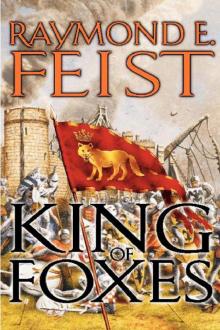 King of Foxes
King of Foxes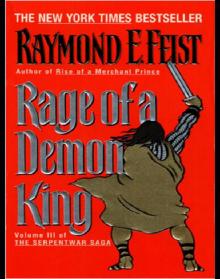 Rage of a Demon King
Rage of a Demon King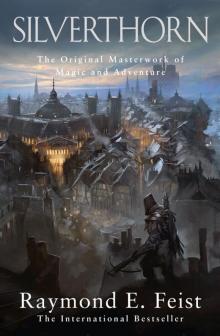 Silverthorn
Silverthorn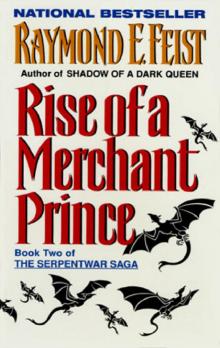 Rise of a Merchant Prince
Rise of a Merchant Prince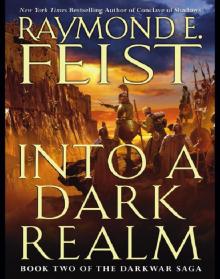 Into a Dark Realm: Book Two of the Darkwar Saga
Into a Dark Realm: Book Two of the Darkwar Saga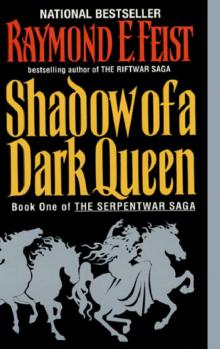 Shadow of a Dark Queen
Shadow of a Dark Queen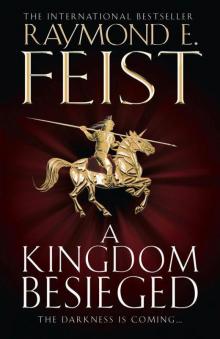 A Kingdom Besieged
A Kingdom Besieged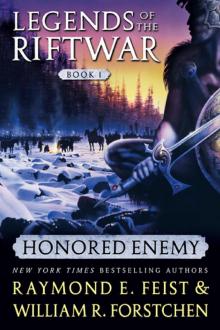 Honored Enemy
Honored Enemy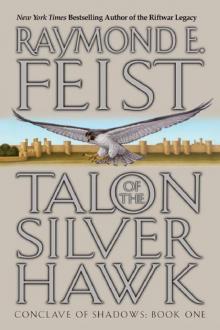 Talon of the Silver Hawk
Talon of the Silver Hawk The Complete Legends of the Riftwar Trilogy
The Complete Legends of the Riftwar Trilogy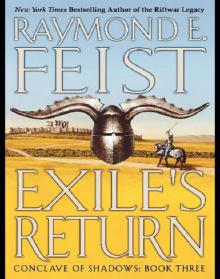 Exile's Return: Conclave of Shadows: Book Three
Exile's Return: Conclave of Shadows: Book Three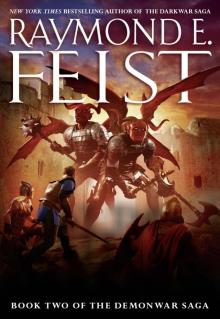 At the Gates of Darkness
At the Gates of Darkness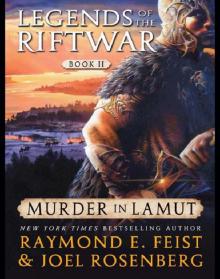 Murder in LaMut: Legends of the Riftwar: Book II
Murder in LaMut: Legends of the Riftwar: Book II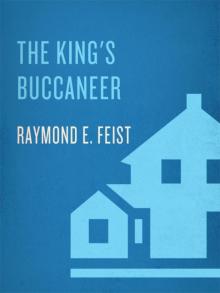 The King's Buccaneer
The King's Buccaneer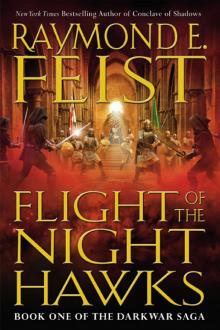 Flight of the Nighthawks
Flight of the Nighthawks The Riftwar Saga
The Riftwar Saga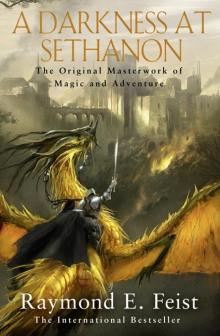 A Darkness at Sethanon
A Darkness at Sethanon Magician: Master
Magician: Master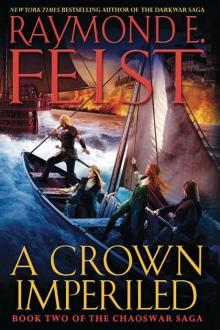 A Crown Imperiled
A Crown Imperiled Magician: Apprentice
Magician: Apprentice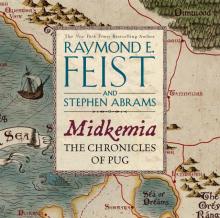 Midkemia
Midkemia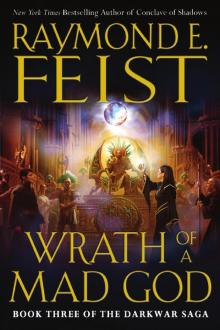 Wrath of a Mad God
Wrath of a Mad God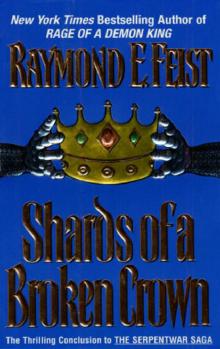 Shards of a Broken Crown
Shards of a Broken Crown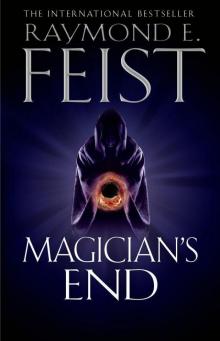 Magician's End
Magician's End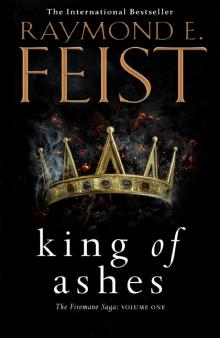 King of Ashes
King of Ashes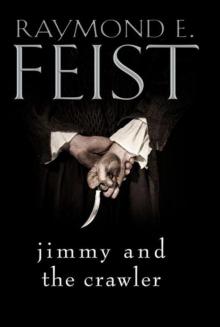 Jimmy and the Crawler
Jimmy and the Crawler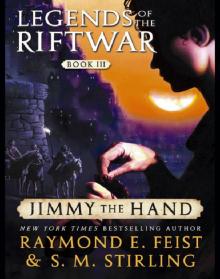 Jimmy the Hand: Legends of the Riftwar, Book 3
Jimmy the Hand: Legends of the Riftwar, Book 3 Queen of Storms
Queen of Storms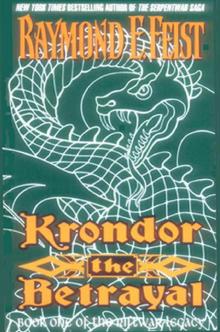 Krondor: The Betrayal
Krondor: The Betrayal Magician
Magician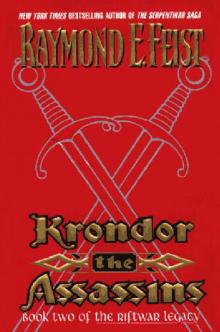 Krondor: The Assassins
Krondor: The Assassins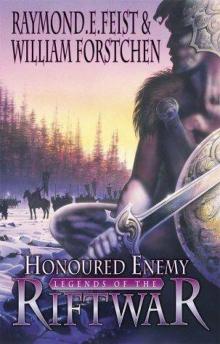 Honoured Enemy
Honoured Enemy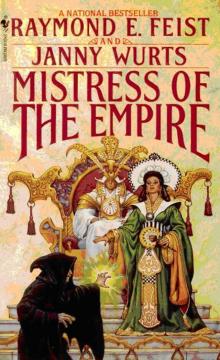 Mistress of the Empire
Mistress of the Empire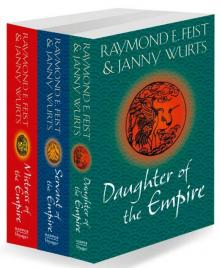 The Complete Empire Trilogy
The Complete Empire Trilogy Legends 1 - Honoured Enemy
Legends 1 - Honoured Enemy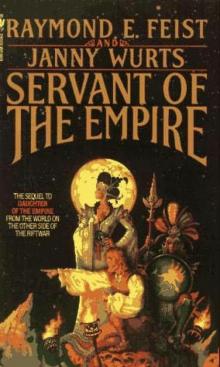 Empire - 02 - Servant Of The Empire
Empire - 02 - Servant Of The Empire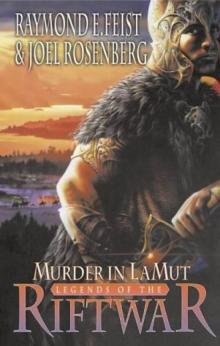 Murder In LaMut
Murder In LaMut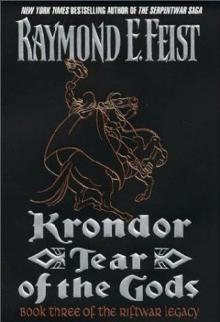 Krondor Tear of the Gods
Krondor Tear of the Gods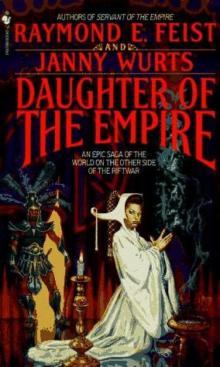 Empire - 01 - Daughter Of The Empire
Empire - 01 - Daughter Of The Empire![King of Ashes [Book One] Read online](http://i1.bookreadfree.com/i1/03/30/king_of_ashes_book_one_preview.jpg) King of Ashes [Book One]
King of Ashes [Book One]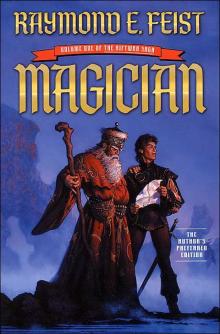 Magician (10th Aniversary Edition)
Magician (10th Aniversary Edition) Prince of the Blood, the King's Buccaneer
Prince of the Blood, the King's Buccaneer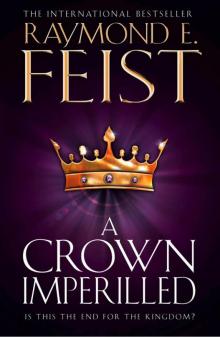 A Crown Imperilled cs-2
A Crown Imperilled cs-2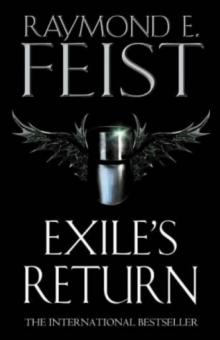 Exile's Return
Exile's Return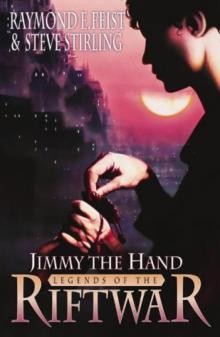 Jimmy the Hand
Jimmy the Hand Book 1 - Magician
Book 1 - Magician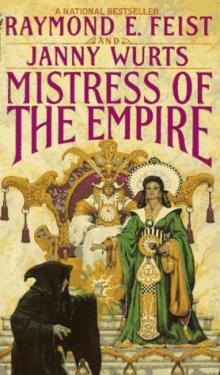 Empire - 03 - Mistress Of The Empire
Empire - 03 - Mistress Of The Empire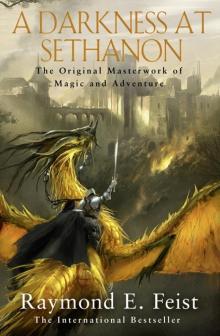 Darkness at Sethanon
Darkness at Sethanon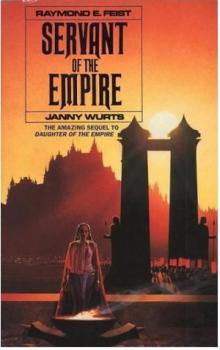 Servant of the Empire
Servant of the Empire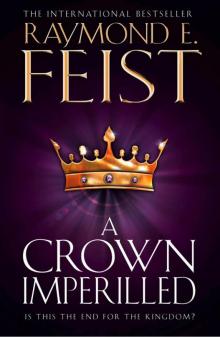 A Crown Imperilled
A Crown Imperilled Rides a Dread Legion
Rides a Dread Legion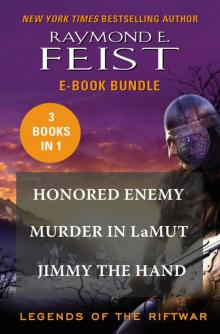 Legends of the Riftwar
Legends of the Riftwar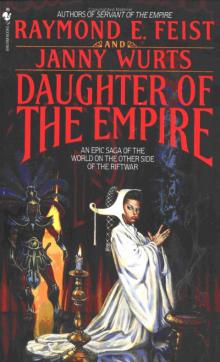 Daughter of the Empire
Daughter of the Empire The Riftwar Saga Trilogy: Magician, Silverthorn and A Darkness at Sethanon
The Riftwar Saga Trilogy: Magician, Silverthorn and A Darkness at Sethanon